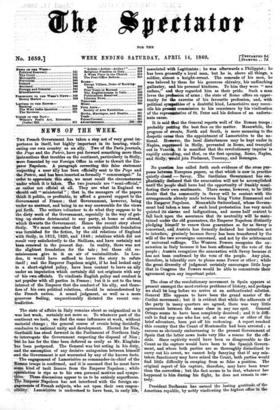The state of affairs in Italy remains about as enigmatical
as it 'vas last week, certainly not more so. To whatever part of the continent we look, we find the same influences at work, without material change ; the general course of events being decidedly .conducive to national unity and development. Elected for Nice, Garibaldi has stood forward in the Parliament of Northern Italy to interrogate the Government respecting the disposal of Nice ; 'but be has for the time been deferred as easily as Mr. Kinglake -has been postponed. The General was but acting in his duty, and the assumption of any decisive antagonism between himself and the Government is not warranted by any of the known facts.
The engagement of Lamoriciere as commander-in-chief of the Roman troops is confirmed, and it is assumed that he must have some kind of tacit licence from the Emperor Napoleon ; while speculation is ripe as to his own personal motives and sympa- thies. These discussions appear to us to be entirely superfluous. The Emperor Napoleon has not interfered with the foreign en- gagements of French subjects, who act upon their own respon- sibility. Lamoriciere is understood to have been, in early life, associated with Legitimists ; he was afterwards a Philippist ; he has been generally a loyal man, but he is, above all things, a soldier, almost a knight-errant. The comrade of his men, he was beloved by them for his generous chivalry, his unflinching gallantry, and his personal kindness. To him they were " mes enfans," and they regarded him as their pride. Such a man loves the profession of arms ; the state of Rome offers an oppor- tunity for the exercise of his favourite profession, and, with political sympathies of a doubtful kind, Lamoriciere may recon- cile his present commission to his conscience by his vindication of the representative of St. Peter and his defence of an unfortu- nate cause.
It is said that the General reports well of the Roman troops ; probably putting the best face on the matter. Meanwhile, the progress of events, North and South, is more menacing to the despotic cause than the appointment of Lamoriciere to the na- tional. However, the local disturbances may be kept under in Naples, suppressed in Sicily, prevented in Rome, and trampled out in Venetia, it is manifest that the revolutionary impulse is rapidly extending, and that, on the first opening, Rome, Naples, and Sicily, would join Piedmont, Tuscany, and Romagna.


























